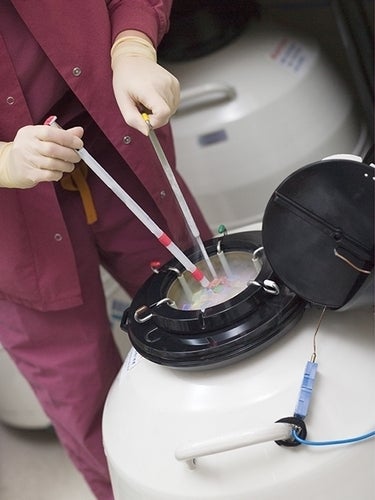When it comes to reproductive fertility, the biological clock is always ticking. And while medical science has come a long way since Louise Brown became the world’s first test-tube, or in-vitro fertilization (IVF) baby in 1978, scientists still haven’t found a way to stop and start the clock at will.
There are, however, more options for women when it comes to issues of timing, such as the retrieval, freezing and preservation of ovarian eggs for later fertilization — with much of the process, but not all — done in Central Massachusetts.
Experts at UMass Memorial Medical Center in Worcester and at Boston IVF — which has offices in Worcester, Framingham, Milford and Westborough — say that the technology of egg freezing has grown over the past decade, offering an option previously not available to women, but still evolving and raising new questions along the way.
Egg freezing is a relatively simple, straightforward process that potentially delivers significant results.
The assisted-fertility process of freezing ovarian eggs is also known as egg vitrification. First, six to 10 eggs are harvested from a patient’s ovaries, dehydrated, put into liquid nitrogen and stored at minus-196 degrees Celsius. When the patient is ready — months or years later — the eggs are fertilized and put back into the uterus as embryos, ideally resulting in a viable, healthy pregnancy.
Some considerations
Women investigate egg freezing for a varierty reasions. Upcoming cancer treatments may impact fertility, for example. Entering prime childbearing years without a partner is another common reason, says Dr. Kim Thornton, a reproductive endocrinologist at Boston IVF. The older a woman gets, the more egg quality declines.
“More women are doing it. It allows women to preserve reproductive options they may not have as they continue to get older,” she said. “A woman who freezes eggs at 35 and comes back with an interest in conceiving at 40 is going to have better egg quality.”
Thornton added that advances in technology have made frozen eggs’ chances of survival and embryo development “excellent.” That isn’t to say a patient will definitely conceive or carry a baby to term, Thornton noted, but it’s a strong alternative before exploring other options, like egg donors or adoption.
Retrieval of six to 10 eggs will usually run in the $10,000 range, said Dr. Julia Johnson, chair of the Department of Obstetrics and Gynecology at UMass Memorial Medical Center, plus several hundred dollars each year for storage. If it is a case where radiation and chemotherapy are needed by a woman with cancer, insurance will cover egg retrieval, she said, as those treatments can damage ovaries.
“It’s very easy to quickly stimulate the ovaries to produce extra eggs,” said Johnson. “More is better.”
Cancer treatment or lack of a partner aren’t the only reasons women freeze eggs. According to Business Insider, Google, Facebook and Apple offer coverage of egg retrieval for women who may be looking to delay childbearing for career reasons.
Thornton also said that not just a cancer diagnosis, but a woman’s general medical history may bring them to explore if egg retrieval is right for them. A patient who is a carrier of a BRCA mutation, for example — a genetic mutation of tumor suppressor genes — may want to consider having her children earlier.
“The point is to have a consultation to discuss the optimal time for them,” she said, with egg freezing a potential tool now in the medical community’s arsenal of solutions.
No local lab
Central Massachusetts, however, cannot yet offer complete egg freezing services. Boston IVF and UMass Memorial joined forces about eight years ago, said Johnson, but without a local lab in which to store frozen eggs, UMass Memorial and local Boston IVF locations rely on the Boston IVF facility in Waltham for egg retrieval and storage.
Local Boston IVF offices and UMass Memorial counsel women, stimulate ovulation and perform bloodwork; but actual retrieval — which can take as little as 15 minutes — and storage is done in Boston IVF’s Waltham location.
Anthony Berry, spokesman for UMass Memorial Health Care, said demand for egg freezing hasn’t yet required the system to build or renovate a lab for retrieval and storage.
“Having a centralized IVF facility allows care providers in the region to focus more of our attention on patients. If we reach a point of critical mass where access would become problematic for our patients, we would certainly consider alternatives to address any gaps” Berry said.
Ethics and education
No matter where it’s done, the concept of egg freezing raises ethical questions and underscores the need for education, say Johnson and Thornton.
The gender of embryos can be found very early, Johnson said. “You can grow them out until they are multiple cells, pull out one or two cells, freeze, and send the cells to a genetics lab,” she said.
Jeffrey Steinberg, medical director of The Fertility Institutes, based in Los Angeles, Calif., says more parents are choosing the sex of their babies based on preference only. “Interest has increased tenfold in the last ten years,” he said in an interview with TheDenverChannel.com in May.
But sometimes, gender has more importance than deciding what color to decorate a nursery. Certain genetic abnormalities like the blood-clotting disorder hemophilia are much more likely to affect boys than girls, Johnson said, as an example.
She said genetic disorders like cystic fibrosis or multiple sclerosis can also be detected in embryos. Those that don’t show the disease can be transferred, the others discarded.
“Some could have an ethical issue with that, but I believe it’s a family’s decision,” Johnson said.
Thornton finds that a large part of her job as a physician in this field is educating women in general. She is surprised that more are not aware of the link between age and decreased fertility. She also wants women to know that egg freezing increases women’s options, but isn’t a guarantee.
“Every egg does not result in a baby,” Thornton said.

